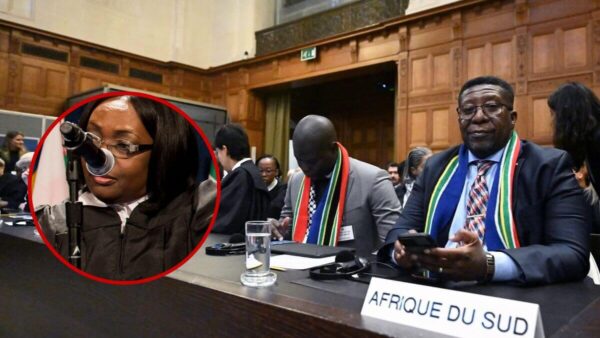The International Court of Justice has ruled that Israel must start making efforts to prevent acts of genocide and provide aid to Palestine but refrained from calling for a full cease-fire as the conflict continues.
South Africa’s legal inquiry has yielded modest fruit in the fight to stop Israel as it carries out large-scale attacks against the Palestinian people in Gaza. While the ICJ’s panel of 17 judges met 15 of the 17 conditions South Africa demanded Israel carry out to mitigate the conflict, the nation’s requests for an immediate cease-fire and for Israel to fully halt its military campaign in Gaza have yet to be met.
One judge from Uganda, Julia Sebuntinde, voted against all of the measures, arguing that “the dispute between the State of Israel and the people of Palestine is essentially and historically a political one.”

“It is not a legal dispute susceptible to judicial settlement by the Court,” Sebuntinde said in her dissenting opinion.
Israel’s military offensive and forces have killed 26,000 Palestinians, mostly women, and children since the war started last October. Nearly 65,000 people have been injured, and more than 1,000 are missing or presumed dead, according to the Palestinian Health Ministry.
According to the interim court order, Israel must “take all measures within its power to prevent and punish the direct and public incitement to commit genocide in relation to members of the Palestinian group in the Gaza Strip” and “take immediate and effective measures to ensure the provision of urgently needed basic services and humanitarian assistance to address the adverse conditions” Palestinians are currently facing.
It also said Israel must preserve any evidence connected to allegations of genocide.
However, Sebuntinde argued that South Africa didn’t prove that Israel’s actions were “committed with the necessary genocidal intent and that as a result, they are capable of falling within the scope of the Genocide Convention.”
Adonia Ayebare, ambassador and permanent representative of Uganda to the United Nations, took to X to condemn Sebuntinde’s opinion.
“Justice Sebutinde ruling at the International Court of Justice does not represent the Government of Uganda’s position on the situation in Palestine,” Ayebare wrote. “She has previously voted against Uganda’s case on DRC. Uganda’s support for the plight of the Palestinian people has been expressed through Uganda‘s voting pattern at the United Nations.”
Israel’s Reaction to the International Court of Justice’s Ruling
Israel worked to dismiss the case, but after reviewing the country’s appeal, ICJ President Joan E. Donoghue said the court would not accept their request and assessed there were plausible claims of possible genocidal acts.
In a statement swiftly issued by Israel President Benjamin Netanyahu after the ruling, he called the decision “not only false” but “outrageous” and said that Israel has “an inherent right to defend itself.” Netanyahu also said that the Israeli government will “continue to do what is necessary to defend our country.”
South Africa welcomed the “landmark ruling” and stated the court had “determined that Israel’s actions in Gaza are plausibly genocidal” by establishing provisional measures that are “directly binding.” When they brought their case to the ICJ, the country alleged that the “acts” committed by Israel were “genocidal in character because they are intended to bring about the destruction of a substantial part of the Palestinian national, racial and ethnical group.”
Palestinian leaders also responded to the ruling.
“ICJ judges assessed the facts and the law, ruled in favor of humanity and international law,” Riyad Al-Maliki, the foreign minister for the Palestinian Authority, said.
The International Court of Justice is the highest court in the United Nations. While it has the authority to make rulings on acts of war and global conflict, it doesn’t have the power to enforce orders. The court relies on governmental leaders to answer to the stipulations it lays out in its rulings.
It gave Israel a month to submit a report on all of the provisions it listed in its ruling.
Its decision on Israel’s role in the conflict does not include a ruling on whether the nation committed genocide. That investigation could reportedly take years to complete.


